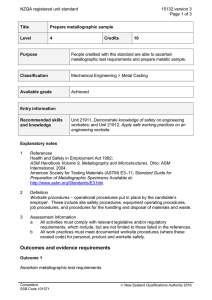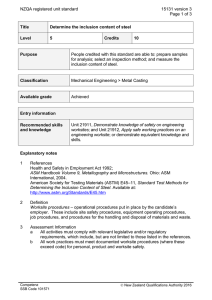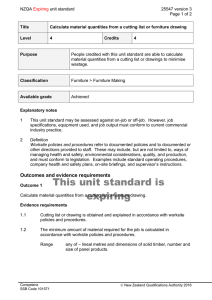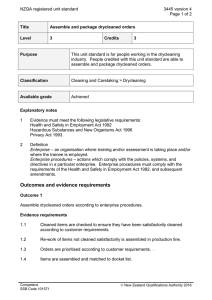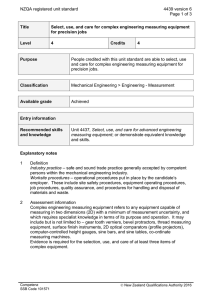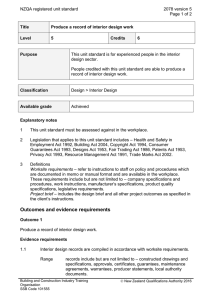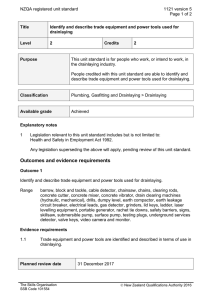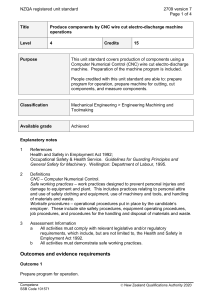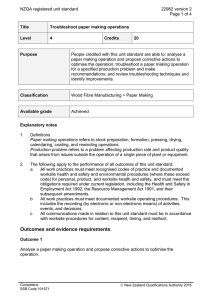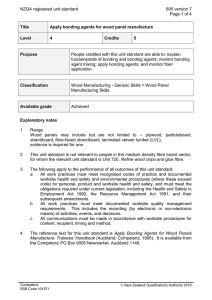NZQA registered unit standard 722 version 7 Page 1 of 3
advertisement
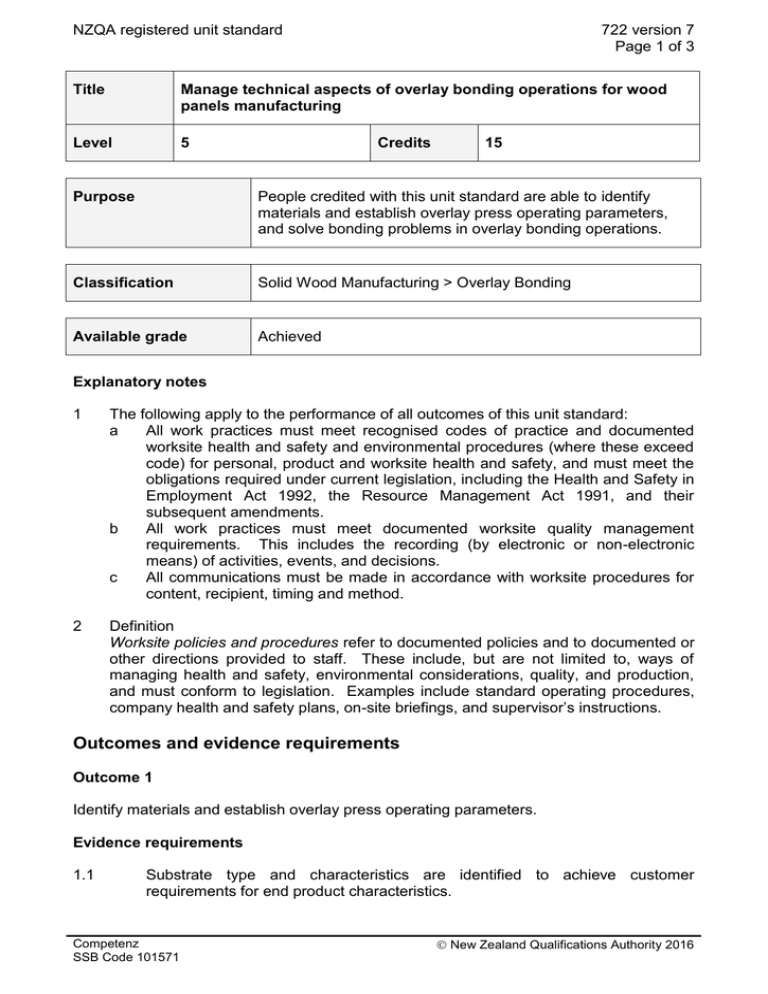
NZQA registered unit standard 722 version 7 Page 1 of 3 Title Manage technical aspects of overlay bonding operations for wood panels manufacturing Level 5 Credits 15 Purpose People credited with this unit standard are able to identify materials and establish overlay press operating parameters, and solve bonding problems in overlay bonding operations. Classification Solid Wood Manufacturing > Overlay Bonding Available grade Achieved Explanatory notes 1 The following apply to the performance of all outcomes of this unit standard: a All work practices must meet recognised codes of practice and documented worksite health and safety and environmental procedures (where these exceed code) for personal, product and worksite health and safety, and must meet the obligations required under current legislation, including the Health and Safety in Employment Act 1992, the Resource Management Act 1991, and their subsequent amendments. b All work practices must meet documented worksite quality management requirements. This includes the recording (by electronic or non-electronic means) of activities, events, and decisions. c All communications must be made in accordance with worksite procedures for content, recipient, timing and method. 2 Definition Worksite policies and procedures refer to documented policies and to documented or other directions provided to staff. These include, but are not limited to, ways of managing health and safety, environmental considerations, quality, and production, and must conform to legislation. Examples include standard operating procedures, company health and safety plans, on-site briefings, and supervisor’s instructions. Outcomes and evidence requirements Outcome 1 Identify materials and establish overlay press operating parameters. Evidence requirements 1.1 Substrate type and characteristics are identified to achieve customer requirements for end product characteristics. Competenz SSB Code 101571 New Zealand Qualifications Authority 2016 NZQA registered unit standard Range 1.2 722 version 7 Page 2 of 3 type may include but is not limited to – medium density fibreboard, high density fibreboard, particleboard, hardboard, strandboard; characteristics may include but are not limited to – moisture content, water resistance, impact resistance, thickness, overall density, surface density, amount of permissible cup and bow, internal bond, dimensions, surface characteristics, modulus of rupture, modulus of elasticity. Resin-impregnated paper is identified in terms of resin type, resin content, and characteristics to achieve customer requirements for end product characteristics. Range resin type may include but is not limited to – melamine, urea and phenol formaldehyde, diallyphthalate (DAP); resin content may include but is not limited to – volatile content, wear resistance, scratch resistance; characteristics may include but are not limited to – shelf life, storage requirements, impact resistance, stain resistance, thickness, density, colour. 1.3 Manufacturing conditions are matched to customer requirements and end product characteristics to achieve board stability. 1.4 Methods of achieving customer requirements for surface texture and finish are selected to meet pressing equipment and resin type. Range 1.5 may include but are not limited to – caul plates, embosser, paper texture, multiple overlays, resin type, caul mats. Press operating parameters are established to correspond to identified materials and customer requirements. Range may include but are not limited to – press closure time, pressure, pressure cycle, press temperature, time in press. Outcome 2 Solve bonding problems in overlay bonding operations. Evidence requirements 2.1 Problem causes and potential solutions are identified using available data. Range 2.2 problems include but are not limited to – bowing, scratches, dents, torn paper, incorrect paper positioning on substrate, double paper, panels sticking to press, temperature variation over panel, surface defects, foreign matter, delamination, dust contamination, incorrect colour, incorrect gloss level, blowing. Best solution is selected and evaluated with regard to worksite policies and procedures. Competenz SSB Code 101571 New Zealand Qualifications Authority 2016 NZQA registered unit standard Planned review date 722 version 7 Page 3 of 3 31 December 2016 Status information and last date for assessment for superseded versions Process Version Date Last Date for Assessment Registration 1 25 January 1995 31 December 2012 Review 2 24 November 1995 31 December 2012 Revision 3 12 February 1998 31 December 2012 Review 4 25 March 1999 31 December 2012 Review 5 29 March 2005 31 December 2012 Rollover and Revision 6 23 February 2007 31 December 2013 Review 7 19 April 2012 N/A Consent and Moderation Requirements (CMR) reference 0173 This CMR can be accessed at http://www.nzqa.govt.nz/framework/search/index.do. Please note Providers must be granted consent to assess against standards (accredited) by NZQA, before they can report credits from assessment against unit standards or deliver courses of study leading to that assessment. Industry Training Organisations must be granted consent to assess against standards by NZQA before they can register credits from assessment against unit standards. Providers and Industry Training Organisations, which have been granted consent and which are assessing against unit standards must engage with the moderation system that applies to those standards. Requirements for consent to assess and an outline of the moderation system that applies to this standard are outlined in the Consent and Moderation Requirements (CMR). The CMR also includes useful information about special requirements for organisations wishing to develop education and training programmes, such as minimum qualifications for tutors and assessors, and special resource requirements. Comments on this unit standard Please contact the Competenz at info@competenz.org.nz if you wish to suggest changes to the content of this unit standard. Competenz SSB Code 101571 New Zealand Qualifications Authority 2016
